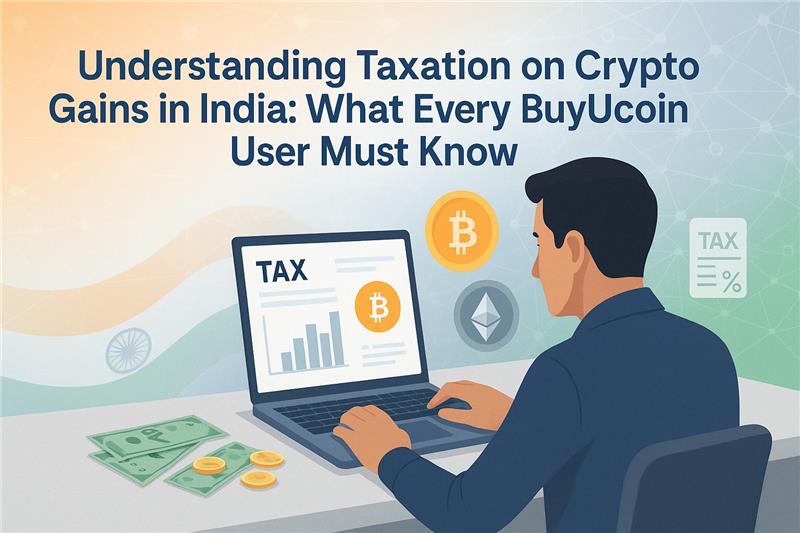
Understanding Taxation on Crypto Gains in India: What Every BuyUcoin User Must Know

Understanding Taxation on Crypto Gains in India: What Every BuyUcoin User Must Know
The world of cryptocurrency in India is evolving at lightning speed. With platforms like BuyUcoin making it easy for users to buy, sell, and store digital assets securely, more Indians are entering the crypto space every day. From Bitcoin and Ethereum to newer tokens, investors are exploring opportunities to grow their wealth in the digital economy.
But there’s one thing every investor must face: tax on crypto in India. While profits can be exciting, the tax rules can feel overwhelming if you don’t know where to start. Understanding how these rules work is not just about compliance—it’s about maximizing your returns, avoiding penalties, and making informed financial decisions.
If you are a BuyUcoin user, this guide will walk you through everything you must know about crypto taxation in India, complete with rules, examples, and practical tips to stay on top of your obligations.
Why Taxation on Crypto Matters
India is one of the world’s fastest-growing crypto markets, with an estimated 15 million+ investors already trading. The government could not ignore this rising trend, which is why the Union Budget 2022 introduced clear tax rules for virtual digital assets (VDAs), including cryptocurrencies and NFTs.
These rules changed the way Indian investors trade. From flat taxes to TDS deductions, every transaction you make on BuyUcoin now has a tax implication. Knowing the details will save you from unpleasant surprises during tax season.
The Evolution of Tax on Crypto in India
For years, crypto was in a grey zone—investors weren’t sure how to report gains. Some showed them as capital gains, others as business income. This lack of clarity led to underreporting and confusion.
Pre-2022: No formal guidance; taxation was left to interpretation.
Union Budget 2022: A game-changer. The government imposed a 30% flat tax on all crypto gains.
July 2022: A 1% TDS became applicable on all transactions above ₹10,000.
Today: A well-defined but strict tax framework ensures crypto is recognized yet regulated.
Tax on Crypto in India: Key Rules
1. Flat 30% Tax on Profits
Any income from the transfer of crypto is taxed at 30% flat. Unlike shares or mutual funds, no indexation benefits or deductions (other than cost of acquisition) are allowed.
Example:
Buy Bitcoin at ₹1,00,000.
Sell at ₹1,40,000.
Profit = ₹40,000.
Tax = ₹12,000.
No deductions for internet bills, electricity charges, or exchange fees.
2. 1% TDS on Every Transaction
Every time you buy or sell crypto worth more than ₹10,000, 1% TDS applies. Platforms like BuyUcoin automatically deduct this and deposit it with the government.
Even if you make a loss, TDS will still be charged. You can claim it back while filing your ITR.
3. No Set-Off of Losses
Unlike stocks, you cannot offset crypto losses against other income.
Loss in Bitcoin cannot be adjusted against profit in Ethereum.
Losses from crypto cannot be set off against income from shares, property, or salary.
4. Gifting Crypto is Taxable
If you gift crypto worth more than ₹50,000, the recipient must pay tax unless it comes under exempt categories like gifts from relatives or on occasions like marriage.
5. Audit Applicability
Frequent traders must be cautious. If your turnover exceeds certain thresholds, a tax audit under the Income Tax Act may apply.
How This Affects BuyUcoin Users
BuyUcoin is one of the most trusted crypto exchanges in India, but users must understand how taxation directly impacts their portfolio. Let’s look at a realistic scenario:
Investment: ₹2,00,000 in Ethereum.
Selling Price: ₹3,00,000.
Profit: ₹1,00,000.
Tax Payable: ₹30,000 (30%).
TDS Deducted: ₹3,000 (1% of selling price).
So, your effective post-tax gain is only ₹67,000, not ₹1,00,000. This shows why tax planning is essential before trading.
Common Mistakes by Indian Crypto Investors
Assuming TDS is final tax – Many believe 1% TDS is the only liability, but 30% income tax still applies.
Not reporting small gains – Even a ₹500 gain is taxable under the current rules.
Ignoring gift taxes – Sending crypto as a gift without checking tax liability can create problems.
Lack of record-keeping – Without proper transaction logs, filing accurate returns becomes difficult.
Practical Tax Filing Tips
Keep Records: Save transaction IDs, wallet details, and trade histories.
Use Crypto Tax Software: Tools that integrate with BuyUcoin can simplify calculations.
Plan Your Trades: Selling in parts across different financial years may reduce liability.
Seek Professional Advice: A CA or tax expert ensures compliance while optimizing returns.
Broader Implications for India’s Crypto Market
Though strict, India’s taxation framework legitimizes crypto as an asset class. Instead of banning, the government has chosen to regulate. This is a positive step for the ecosystem.
Blockchain adoption is rising in governance and finance.
Central Bank Digital Currency (CBDC) projects are underway.
Exchanges like BuyUcoin will likely play a key role in merging traditional finance with crypto assets.
While taxation cuts into profits, it also establishes crypto’s credibility in the financial system.
Final Thoughts
The landscape of tax on crypto in India may seem complex, but it’s manageable with the right knowledge. For BuyUcoin users, awareness of these rules means more confidence while trading, fewer surprises during tax season, and smarter financial planning.
Ready to trade smarter?
Visit BuyUcoin now to buy and sell cryptocurrencies in India safely and seamlessly.
Sign up with BuyUcoin today and join thousands of Indians building their wealth with crypto—securely, smartly, and in full compliance with India’s tax rules. Your journey to financial freedom starts here!